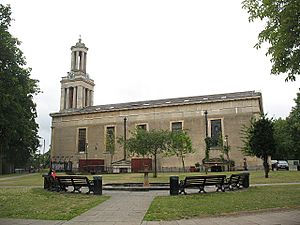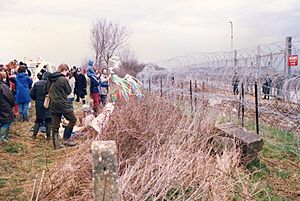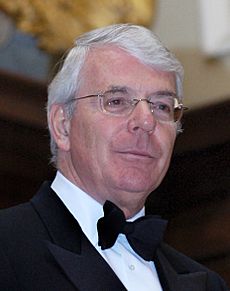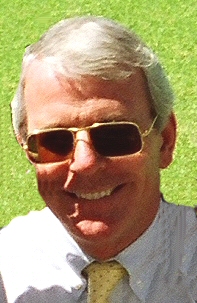John Major facts for kids
Quick facts for kids
Sir John Major
|
|||||||||||||||||||||||||||||||||||
|---|---|---|---|---|---|---|---|---|---|---|---|---|---|---|---|---|---|---|---|---|---|---|---|---|---|---|---|---|---|---|---|---|---|---|---|
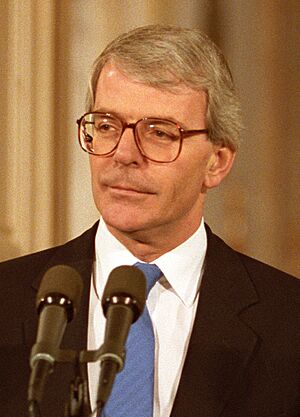
Major in 1993
|
|||||||||||||||||||||||||||||||||||
| Prime Minister of the United Kingdom | |||||||||||||||||||||||||||||||||||
| In office 28 November 1990 – 2 May 1997 |
|||||||||||||||||||||||||||||||||||
| Monarch | Elizabeth II | ||||||||||||||||||||||||||||||||||
| Deputy | Michael Heseltine (1995–1997) | ||||||||||||||||||||||||||||||||||
| Preceded by | Margaret Thatcher | ||||||||||||||||||||||||||||||||||
| Succeeded by | Tony Blair | ||||||||||||||||||||||||||||||||||
| Leader of the Opposition | |||||||||||||||||||||||||||||||||||
| In office 2 May 1997 – 19 June 1997 |
|||||||||||||||||||||||||||||||||||
| Monarch | Elizabeth II | ||||||||||||||||||||||||||||||||||
| Prime Minister | Tony Blair | ||||||||||||||||||||||||||||||||||
| Preceded by | Tony Blair | ||||||||||||||||||||||||||||||||||
| Succeeded by | William Hague | ||||||||||||||||||||||||||||||||||
| Leader of the Conservative Party | |||||||||||||||||||||||||||||||||||
| In office 27 November 1990 – 19 June 1997 |
|||||||||||||||||||||||||||||||||||
| Deputy | Viscount Whitelaw (1990–1991) | ||||||||||||||||||||||||||||||||||
| Preceded by | Margaret Thatcher | ||||||||||||||||||||||||||||||||||
| Succeeded by | William Hague | ||||||||||||||||||||||||||||||||||
| Chancellor of the Exchequer | |||||||||||||||||||||||||||||||||||
| In office 26 October 1989 – 28 November 1990 |
|||||||||||||||||||||||||||||||||||
| Prime Minister | Margaret Thatcher | ||||||||||||||||||||||||||||||||||
| Preceded by | Nigel Lawson | ||||||||||||||||||||||||||||||||||
| Succeeded by | Norman Lamont | ||||||||||||||||||||||||||||||||||
| Foreign Secretary | |||||||||||||||||||||||||||||||||||
| In office 24 July 1989 – 26 October 1989 |
|||||||||||||||||||||||||||||||||||
| Prime Minister | Margaret Thatcher | ||||||||||||||||||||||||||||||||||
| Preceded by | Geoffrey Howe | ||||||||||||||||||||||||||||||||||
| Succeeded by | Douglas Hurd | ||||||||||||||||||||||||||||||||||
| Chief Secretary to the Treasury | |||||||||||||||||||||||||||||||||||
| In office 13 June 1987 – 24 July 1989 |
|||||||||||||||||||||||||||||||||||
| Prime Minister | Margaret Thatcher | ||||||||||||||||||||||||||||||||||
| Preceded by | John MacGregor | ||||||||||||||||||||||||||||||||||
| Succeeded by | Norman Lamont | ||||||||||||||||||||||||||||||||||
|
|||||||||||||||||||||||||||||||||||
|
|||||||||||||||||||||||||||||||||||
| Member of Parliament for Huntingdon |
|||||||||||||||||||||||||||||||||||
| In office 3 May 1979 – 14 May 2001 |
|||||||||||||||||||||||||||||||||||
| Preceded by | David Renton | ||||||||||||||||||||||||||||||||||
| Succeeded by | Jonathan Djanogly | ||||||||||||||||||||||||||||||||||
| Personal details | |||||||||||||||||||||||||||||||||||
| Born | 29 March 1943 St Helier, Surrey, England |
||||||||||||||||||||||||||||||||||
| Political party | Conservative | ||||||||||||||||||||||||||||||||||
| Spouse | |||||||||||||||||||||||||||||||||||
| Children | 2 | ||||||||||||||||||||||||||||||||||
| Parent |
|
||||||||||||||||||||||||||||||||||
| Relatives | Terry Major-Ball (brother) | ||||||||||||||||||||||||||||||||||
| Education | Rutlish School | ||||||||||||||||||||||||||||||||||
| Signature |  |
||||||||||||||||||||||||||||||||||
Sir John Major (born 29 March 1943) is a British politician who was the Prime Minister of the UK from 1990 to 1997. He was also the Leader of the Conservative Party. Before becoming prime minister, he held important government jobs, called Cabinet positions, under Prime Minister Margaret Thatcher.
As prime minister, Major led the country during the Gulf War and helped create peace in Northern Ireland. He replaced an unpopular tax called the Poll Tax with the Council Tax, which is still used today. In 1992, he led the Conservatives to win a general election, getting over 14 million votes. This is the most votes any political party has ever won in a British election.
However, his time as prime minister was difficult. The country faced economic problems, and his party was divided over issues related to the European Union. In the 1997 general election, his party lost to the Labour Party, led by Tony Blair.
After leaving office, Major has focused on writing and working with businesses and charities. He is often asked for his opinion on political events. As of 2025, he is the oldest living former British prime minister.
Early Life and Education
John Major was born on 29 March 1943 in Surrey, England. His father, Tom Major-Ball, was a former music hall performer, and his mother was named Gwen. The family lived in a middle-class area called Worcester Park. His father ran a business making garden ornaments.
When John was a boy, he enjoyed reading, sports like cricket, and keeping pets. In 1954, he passed an important exam called the 11+ and went to Rutlish School, a grammar school.
Soon after, his family's luck changed. His father's health got worse, and the family business had money problems. They had to sell their house and move to a small, rented flat in Brixton, London. This was a difficult time for the family.
Major left school just before his 16th birthday with three O-level qualifications. He became interested in politics during this time. In 1956, he visited the House of Commons for the first time and watched a debate. He said this event inspired his dream to become a politician.
Early Career and Politics
After leaving school, Major worked as a clerk for an insurance company but found the job boring. He later worked for the London Electricity Board and studied banking at home. In 1959, he joined the Young Conservatives in Brixton and became a very active member.
He stood for election as a local councillor in Lambeth in 1964 but lost. However, he won a seat in the 1968 Lambeth London Borough Council election. As Chairman of the Housing Committee, he was in charge of building new homes for people in the area.
In 1966, he took a job at Standard Bank, which sent him to work in Jos, Nigeria. He enjoyed his time there but had to return home after a serious car crash in 1967.
In April 1970, he met Norma Johnson at a Conservative party event. They got married in October of that year. They have two children, Elizabeth and James.
Major wanted to become a Member of Parliament (MP). After several tries, he was chosen as the Conservative candidate for the safe seat of Huntingdonshire.
Member of Parliament
Major won the Huntingdon seat in the 1979 general election, which brought Margaret Thatcher and the Conservatives to power. He quickly became known as a hard-working MP.
In 1981, he got his first promotion as a Parliamentary private secretary. Two years later, he became an assistant whip, a job that involves making sure MPs from his party vote in Parliament.
In 1985, Major was made a junior minister in the Department of Health and Social Security. He gained public attention in 1987 for helping to increase payments to elderly people during a very cold winter.
Rise to Senior Government Roles
Chief Secretary to the Treasury
After the 1987 general election, Major was promoted to the Cabinet as Chief Secretary to the Treasury. This was a very important job, where he was in charge of government spending. He was the first MP from the 1979 group to reach the Cabinet.
Foreign Secretary
In a surprise move in July 1989, Margaret Thatcher made Major the Foreign Secretary. This put him in charge of the UK's relationships with other countries. He was only in this role for three months, but he dealt with important issues like the future of Hong Kong.
Chancellor of the Exchequer
In October 1989, Major became the Chancellor of the Exchequer, one of the most powerful jobs in government. As Chancellor, he was responsible for the UK's economy. His main goal was to lower inflation (the rate at which prices rise).
In his only Budget in March 1990, he introduced a new type of savings account called a TESSA to encourage people to save money. He also convinced a hesitant Margaret Thatcher that Britain should join the European Exchange Rate Mechanism (ERM) to help control inflation.
Becoming Prime Minister
By late 1990, many people in the Conservative Party were unhappy with Margaret Thatcher's leadership. A new tax, called the poll tax, was very unpopular. After a challenge to her leadership, Thatcher resigned.
John Major, along with two other politicians, entered the race to become the new leader. On 27 November 1990, Major won the most votes. The other candidates withdrew, making him the new Leader of the Conservative Party. The next day, he became Prime Minister. At 47, he was the youngest prime minister in almost 100 years.
Prime Minister (1990–1997)
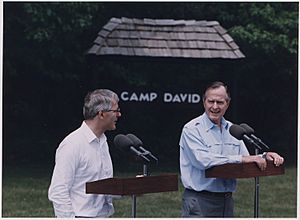
When Major became prime minister, the country was in an economic recession. His government faced high unemployment and rising prices. One of his first major challenges was the Gulf War, where he committed British troops to help free Kuwait.
Major's government replaced the unpopular poll tax with the Council Tax. He also started the Northern Ireland peace process, which aimed to end decades of conflict.
In the 1992 general election, many expected the Conservatives to lose. However, Major led his party to a surprise victory, winning the most votes ever recorded by a British political party.
Second Term and Challenges
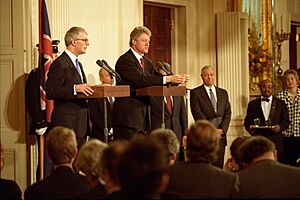
Major's second term was very difficult. In September 1992, a day known as Black Wednesday, the British pound was forced out of the European Exchange Rate Mechanism. This damaged the government's reputation for managing the economy.
His party also became deeply divided over the UK's relationship with the European Union. These arguments, along with other political problems, made his government unpopular.
In 1994, Tony Blair became the leader of the Labour Party. He modernized the party and it became very popular. In the 1997 election, Labour won by a landslide, ending 18 years of Conservative government. On 2 May 1997, John Major resigned as prime minister.
Life After Politics
After the 1997 election, Major served as Leader of the Opposition for a few weeks until a new Conservative leader was chosen. He remained an MP until the 2001 election, when he retired from Parliament.
Since leaving politics, Major has kept a lower profile. He has written books, including his autobiography and books about cricket and music hall history. He is a big fan of cricket and was President of Surrey County Cricket Club.
He is also involved in charity work and has business roles. He has occasionally commented on politics, especially on the topic of Brexit, which he opposed.
In 1999, he was made a Member of the Order of the Companions of Honour for his work on the Northern Ireland peace process. In 2005, Queen Elizabeth II made him a Knight Companion of the Order of the Garter, a very high honour.
Personal Life
John Major married Norma Johnson in 1970. They have two children, Elizabeth and James. They live in Huntingdonshire, the area he represented as an MP.
Major is a keen sports fan, especially of cricket and Chelsea F.C.. He also enjoys gardening and reading.
After the death of Princess Diana in 1997, Major was appointed a special guardian to her sons, Prince William and Prince Harry. He was responsible for legal and administrative matters for them.
Images for kids
See also
 In Spanish: John Major para niños
In Spanish: John Major para niños
- Electoral history of John Major
- First Major ministry
- Second Major ministry
 | Kyle Baker |
 | Joseph Yoakum |
 | Laura Wheeler Waring |
 | Henry Ossawa Tanner |



